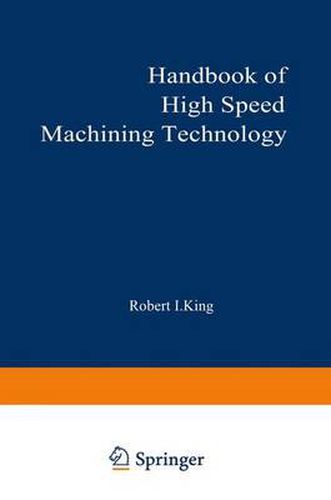Readings Newsletter
Become a Readings Member to make your shopping experience even easier.
Sign in or sign up for free!
You’re not far away from qualifying for FREE standard shipping within Australia
You’ve qualified for FREE standard shipping within Australia
The cart is loading…






This title is printed to order. This book may have been self-published. If so, we cannot guarantee the quality of the content. In the main most books will have gone through the editing process however some may not. We therefore suggest that you be aware of this before ordering this book. If in doubt check either the author or publisher’s details as we are unable to accept any returns unless they are faulty. Please contact us if you have any questions.
The United States now spends approximately $115 billion annually to perform its metal removal tasks using conventional machining technology. Of this total amount, about $14 billion is invested in the aerospace and associated industries. It becomes clear that metal removal technology is a very important candidate for rigorous investigation looking toward improvement of produc tivity within the manufacturing system. To aid in this endeavor, work has begun to establish a new scientific and technical base that will provide prin ciples upon which manufacturing decisions may be based. One of the metal removal areas that has the potential for great economic advantages is high-speed machining and related technology. This text is concerned with discussions of ways in which high-speed machining systems can solve immediate problems of profiling, pocketing, slotting, sculpturing, facing, turning, drilling, and thin-walled sectioning. Benefits to many existing programs are provided by aiding in solving a current management production problem, that of efficiently removing large volumes of metal by chip removal. The injection of new high-rate metal removal techniques into conventional production procedures, which have remained basically unchanged for a cen tury, presents a formidable systems problem, both technically and man agerially.The proper solution requires a sophisticated, difficult process whereby management-worker relationships are reassessed, age-old machine deSigns reevaluated, and a new vista of product/process planning and design admitted.
$9.00 standard shipping within Australia
FREE standard shipping within Australia for orders over $100.00
Express & International shipping calculated at checkout
This title is printed to order. This book may have been self-published. If so, we cannot guarantee the quality of the content. In the main most books will have gone through the editing process however some may not. We therefore suggest that you be aware of this before ordering this book. If in doubt check either the author or publisher’s details as we are unable to accept any returns unless they are faulty. Please contact us if you have any questions.
The United States now spends approximately $115 billion annually to perform its metal removal tasks using conventional machining technology. Of this total amount, about $14 billion is invested in the aerospace and associated industries. It becomes clear that metal removal technology is a very important candidate for rigorous investigation looking toward improvement of produc tivity within the manufacturing system. To aid in this endeavor, work has begun to establish a new scientific and technical base that will provide prin ciples upon which manufacturing decisions may be based. One of the metal removal areas that has the potential for great economic advantages is high-speed machining and related technology. This text is concerned with discussions of ways in which high-speed machining systems can solve immediate problems of profiling, pocketing, slotting, sculpturing, facing, turning, drilling, and thin-walled sectioning. Benefits to many existing programs are provided by aiding in solving a current management production problem, that of efficiently removing large volumes of metal by chip removal. The injection of new high-rate metal removal techniques into conventional production procedures, which have remained basically unchanged for a cen tury, presents a formidable systems problem, both technically and man agerially.The proper solution requires a sophisticated, difficult process whereby management-worker relationships are reassessed, age-old machine deSigns reevaluated, and a new vista of product/process planning and design admitted.